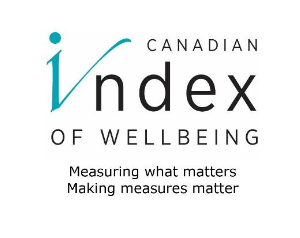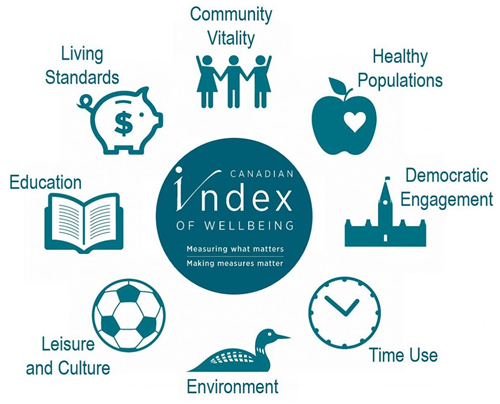
Highlights
On March 6, 2018, Information Orillia formalized a Service Agreement with the University of Waterloo, Office of Research to administer the Canadian Index of Wellbeing community survey.
The survey uses eight domains, as pictured below, to determine the well-being of a community. These domains are similar to the Social Determinants of Health used by health organizations.

Information Orillia negotiated funding partnerships with:
-
City of Orillia
-
Police Services Board
-
North Simcoe Muskoka Local Health Integrated Network (NSMLHIN)
-
Simcoe Muskoka District Health Unit (SMDHU)
-
County of Simcoe (on behalf of participating partners Ramara, Severn, and Oro-Medonte Townships)
7,945 households were randomly selected and invited to participate in this survey. To help ensure a broader age range of respondents, the house-hold member 16 years of age or older with a birthday closest to June 1st was asked to complete the survey. A total of 1,500 survey packages was also distributed directly to households in Oro-Medonte, Ramara, and Severn to expand the reach of the survey and supplement the final sample.
A total of 896 surveys were initially included among the respondents. 72.9% were completed online, with the remaining completed using a paper version that was either requested by residents or completed by residents receiving them through direct distribution. A final response rate of between 10.1% and 10.7% is a reasonable estimate, which places the Orillia and Area Community Wellbeing Survey right at the average of most general populations surveys.
For more information click here.
Information Orillia respectifully acknowledges our presence on the traditional territories of the Anishinaabeg, including the Ojibwe, Odawa, and Potawatomi nations, collectively known as the Three Fires Confederacy, as well as the nations of the surrounding areas, including Rama First Nation. In acknowledging the history and continuing lives of Indigenous peoples in these lands, we confront the continuing issue of colonialism, the harm that it causes, and the ways in which we can work towards reparations and reconcilliation.
